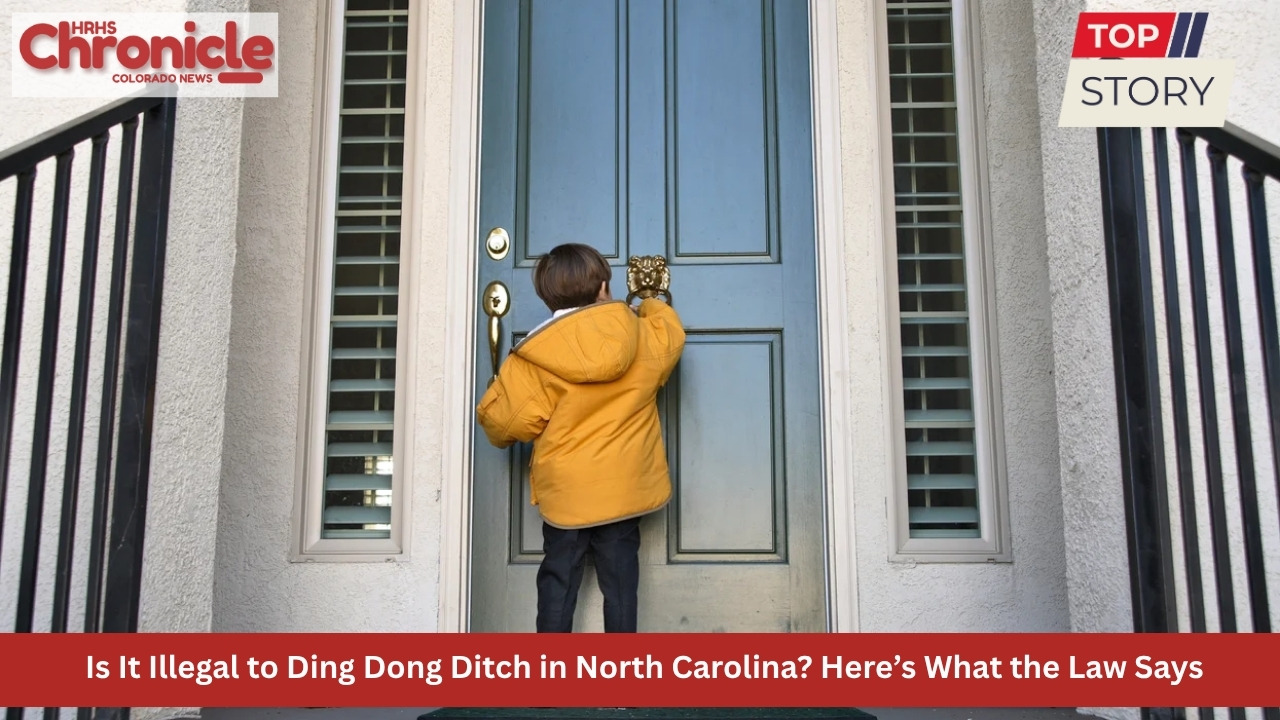Ding dong ditch is a prank where a person rings someone’s doorbell and runs away before the homeowner answers the door. Often associated with youthful mischief, it might seem innocent on the surface, but the reality in Michigan is far more complex. While many remember this prank as a harmless rite of passage, today’s legal environment and evolving attitudes around privacy, property rights, and community safety mean it can quickly cross the line from playful fun to unlawful behavior.
Is Ding Dong Ditching Illegal in Michigan?
Ding dong ditching is not explicitly outlined as a specific crime in Michigan’s penal code. However, this does not mean the act is risk-free or immune from prosecution. Depending on the circumstances, several existing laws may apply to those caught in the act:
Disorderly Conduct: Repeatedly ringing someone’s doorbell late at night or causing significant disturbance to a household could be considered disorderly conduct. This is typically classified as a misdemeanor in Michigan.
Trespassing: Entering private property without permission to ring the doorbell counts as trespassing. The act of stepping onto a person’s property—even briefly—can trigger trespassing charges.
Harassment and Disturbing the Peace: Persistent or targeted pranking that causes emotional distress to the resident may escalate into a charge of harassment or disturbing the peace.
Malicious Use of Telecommunications Services: If the prank involves misuse of a video intercom system or smart doorbell, additional penalties may apply under laws targeting the malicious use of telecommunications services.
Intent, Frequency, and Impact
Michigan law takes several factors into account when evaluating ding dong ditch incidents:
Intent: Was the prankster’s goal simply to startle, or was the act intended to harass or intimidate?
Frequency: One-time occurrences may result in a warning. Repeated or targeted incidents could be classified as harassment or disturbing the peace.
Time of Day: Late-night or early morning incidents are more likely to be seen as disruptive.
Damage or Threat: If property is damaged or a resident feels threatened—by, for example, someone kicking the door or returning multiple times—charges can escalate.
Potential Legal Consequences
Depending on the seriousness of the incident, those caught ding dong ditching in Michigan could face consequences such as:
Fines: Misdemeanor charges can result in fines up to $1,000.
Community Service: Minor offenders may be required to perform community service.
Imprisonment: Serious or repeated offenses may result in up to 6 months in jail, although this is rare for first-time pranksters.
Criminal Record: Being charged with trespassing, disorderly conduct, or harassment could lead to a permanent criminal record, which may have long-term impacts on education or employment prospects.
Civil Lawsuits: In serious cases, homeowners can pursue civil action if they suffer property damage or emotional distress due to repeated pranking.
Real-World Examples and the Dangers of Pranking
Local news and public safety reports in Michigan indicate that while most ding dong ditch cases end in a warning, police have periodically intervened when pranks escalate. In some communities, incidents have provoked strong reactions from homeowners, including confrontations that turn aggressive. In rare but serious cases, misinterpreted actions at the front door have led to accidents or legal disputes between pranksters and residents.
As social media trends like the “door kick challenge” further blur the bounds between pranks and malicious actions, Michigan law enforcement agencies urge caution. Physical damage to property or actions that trigger fear or panic can—and have—resulted in criminal prosecution.
Statistical Perspective
Precise statistics on ding dong ditch prosecutions are difficult to come by, as these incidents are often subsumed under larger categories of misdemeanor misconduct. However, national surveys note a significant rise in complaints relating to “doorbell pranks” since the introduction of smart home security systems, which provide video evidence that can be used in legal proceedings. In Michigan, law enforcement agencies report responding to thousands of nuisance calls each year, a portion of which involve doorbell-related mischief.
Why Context Matters: Youthful Offenders vs. Repeat Harassers
Many offenders are minors, and first-time incidents may be met with parental notification and a warning from the police. However, those who engage in persistent or malicious behavior—or whose actions escalate to property damage or injury—face a much higher risk of prosecution. Michigan law does not exempt minors if the prank meets the criteria for criminal charges, especially if the resident files a formal complaint or there is evidence of repeated, targeted, or damaging actions.
Social and Community Considerations
While law enforcement considers intention and severity, the broader impact on the community is significant:
Community Safety: Ding dong ditch can spark fear, anxiety, and mistrust, especially for elderly or vulnerable residents.
Escalation: A “harmless” prank can escalate quickly if a homeowner feels threatened or reacts defensively.
Neighborhood Reputation: Persistent pranking can lead to increased police presence and community tension.
Changing Attitudes: Advances in home security technology mean that more incidents are recorded, prosecuted, and publicly reported than in the past.
Modern Technology and Legal Evidence
Smart doorbells with video capabilities have shifted the legal landscape. Residents are now more likely to present clear video evidence to the police, making it easier for law enforcement to identify and penalize offenders. This also means the likelihood of prosecution has increased compared to a decade ago, when such acts were harder to investigate or prove.
Parental Responsibility
In Michigan, parents of minors involved in ding dong ditch incidents can be held partially liable for their child’s actions, especially if there is property damage, injury, or repeated complaints. Courts may require families to pay restitution or ensure minors meet court-ordered community service obligations.
How to Respond if You’re a Victim
If you are a Michigan resident dealing with ding dong ditch pranks, here are recommended steps:
Document: Use home surveillance or smart doorbells to collect video evidence of the incident.
Report: Contact local law enforcement if the incidents are frequent or escalate beyond a one-time prank.
Communicate: If known, attempt to address the issue with the responsible party or their parents before escalating to legal action.
Stay Calm: Avoid reacting with aggression or confrontational behavior that could put yourself or others at risk.
Practical Advice for Parents and Kids
For parents, awareness of the legal risks and community impact of ding dong ditching is key. Educate children on respect for others’ property and the potential consequences of pranks—even those that seem harmless.
For kids and teens, remember that even minor mischief can quickly have major repercussions if misunderstood or if it crosses legal or social boundaries.
Frequently Asked Questions About Ding Dong Ditch in Michigan
Is ding dong ditch always prosecuted in Michigan?
No. First-time, harmless pranks may be handled with a warning from police, especially if the prankster is a minor and there is no harm or repeated offense. However, repeated or malicious incidents are more likely to result in charges.
Can homeowners use force against ding dong ditchers?
Michigan law allows residents to protect their home, but using force in response to ding dong ditching is excessive and could lead to legal consequences for the homeowner.
Is it a felony to ding dong ditch?
Generally no. Offenses connected to ding dong ditch, such as trespassing or disorderly conduct, are misdemeanors. Felony charges may arise only if the incident involves significant property damage, injury, or escalation to burglary.
Does intent matter in the eyes of the law?
Yes. The law distinguishes between mischievous intent and malicious harassment. Pranks carried out with the aim to threaten, harass, or damage property are treated more seriously than isolated, non-threatening incidents.
What if a minor is caught ding dong ditching?
Typically, police notify parents or guardians and issue a warning for a first offense. Repeat or severe incidents may be referred to juvenile court.
Can a civil lawsuit be filed over ding dong ditching?
Yes. If ding dong ditching causes property damage, injury, or emotional distress, homeowners may pursue civil litigation against the offender or their parents.
Are there statistics on ding dong ditch cases in Michigan?
Exact numbers are not published, but nuisance complaints involving ding dong ditching are part of thousands of calls received by Michigan police departments each year. Increased video evidence from smart doorbells is leading to higher rates of identification and prosecution.
Closing Thoughts
While ding dong ditch may seem like an old-fashioned prank, Michigan law makes it clear that homeowners’ rights to peace, privacy, and security take precedence. A joke can quickly become a police matter, with the potential for legal and civil consequences. In today’s environment, respect for others’ property and personal boundaries is more important than ever. Exercising caution, empathy, and good judgment will always help keep youthful fun—and community relations—on the right side of the law.
Ref Helpful Links
- https://www.legalreach.com/blog/is-ding-dong-ditching-illegal-it%E2%80%99s-more-serious-than-you-might-think
- https://www.pumphreylawfirm.com/blog/is-ding-dong-ditching-as-harmless-as-pranksters-think/
- https://www.youtube.com/watch?v=S4ksT6lvfGc
- https://www.avvo.com/legal-answers/is-it-allowed-to-ding-dong-ditch–5329846.html
- https://www.michigan.gov/-/media/Project/Websites/egle/Documents/Programs/RRD/AMW/Folder1/Drainage-Ditch-Clean-Out-Report-2017-03-24.pdf?rev=a0e34b2b23dd47b6ad8c703555632580
- https://www.answers.com/law/Is_ding_dong_ditching_illegal

Mrs. Odice has been a teacher here for 9 years. She likes yoga and spends most of her time with her 3 kids. She also grew up going to Douglas County schools and is Canadian.















Leave a Reply